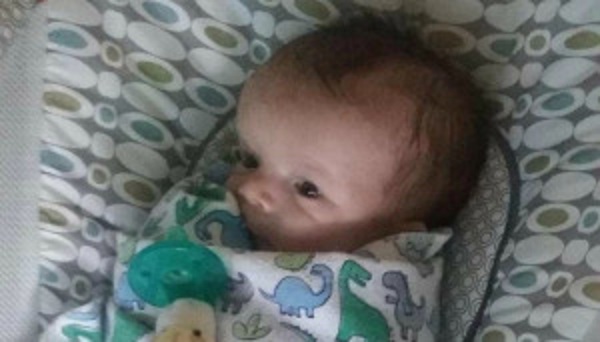A Michigan family is fighting for care for their very sick infant son who has a disease similar to Charlie Gard’s.
Russell Cruzan III, a 4-month-old from near Kalamazoo, Michigan, has a rare mitochondrial disorder that is very similar to the condition that British infant Charlie Gard had before he died Friday, WOOD TV News reports.
Michelle Budnick-Nap, Russell’s mother, said her son began to experience health problems in June, but doctors were not sure what was wrong with him until recently.
“(We) kept asking the nurses why. Why is he not eating? Why isn’t he thriving?” she asked.
A kidney test finally revealed that Russell – affectionately known as “Bubby” – has mitochondrial DNA depletion syndrome 13, a rare disease that affects only a few children in the world. It causes muscle weakness, loss of mobility, decreased kidney function and the inability to swallow, the report states.
Doctors gave Russell a very slim chance of survival, and asked his parents if they wanted to give up and let Russell die. They said no; they want to do everything possible to give their son a chance at life.
“It’s really hard to be told that your child’s chances of even making it to 2 are like 50 percent,” his mother said. “… I always tell them, ‘Bo, we want to do everything we can. We want to fight.’”
The infant was home with his family at the time of the local news report, though he has been in and out of the hospital during the past two months. His parents hope to raise money for Russell to undergo an experimental treatment in Boston, according to the report. Their insurance will not cover all the expenses, so they are raising money through a YouCaring page.
Click here to sign up for pro-life news alerts from LifeNews.com
“We have worked tirelessly to gain the attention of the drs administering these treatments and we are now scheduling [appointments] with 2 of them,” his parents said.
Here’s more from the report:
They say a doctor at Boston Children’s Hospital, who is one of the top mitochondrial physicians in the country, has agreed to treat Russell if a doctor at Bronson can get the insurance company will authorize it. If Russell goes to Boston, he would get a treatment aimed at helping his healthy mitochondria replicate.
“I don’t want to say that we’ve come to terms with it. We love him more than anything in the world,” Budnik-Nap said.
Like Russell’s family, Charlie Gard’s parents hoped to have him transferred to the United States for an experimental treatment. The raised more than $1.5 million for his medical care.
His parents said they knew the chance of the experimental treatment working was slim, but they wanted to try anyway for Charlie’s sake.
However, the courts and hospital refused to allow them to transfer their son to another hospital. About a month ago, the European Court of Human Rights ruled that the hospital can remove Charlie’s life support and allow him to die.
Last week, Charlie’s parents’ ended the legal battle. Their lawyer Grant Armstrong said experts confirmed that it was too late to treat their son. The BBC reports Armstrong “told the presiding judge Mr Justice Francis that US neurologist Dr Michio Hirano had said he was no longer willing to offer the baby experimental therapy after he saw the results of a new MRI scan last week.”
Hirano previously said Charlie had an 11 percent to 56 percent chance of benefiting from the experimental treatment. He and a group of doctors examined Charlie and gave their expert opinions to the judge.
Questions remain about whether Charlie could have benefited from the experimental treatment, had it not been delayed for months during the legal battle between Charlie’s parents and the hospital. The court battle began in March.
Charlie died on Friday after a judge ordered that his ventilator be removed. He would have turned 1 year old on Aug. 4. His family plans to use the money their raised for his care to begin a charity to help other children with rare diseases.








